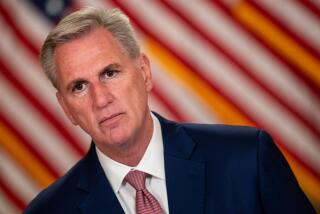COLUMN RIGHT/ TOM BETHELL : Phone Polls Are a Feeble Prop for Policy : Voters’ initial reaction to the Clinton plan will become a tide of ‘vote no’ calls to Congress.
- Share via
President Clinton had barely finished his address to Congress when the pollsters were at their phone banks, asking people if they approved of the new economic plan. A CNN/USA Today poll found 514 Americans who said they had watched the address, and of these, 79% “supported the plan, while 16% were opposed.”
There is no way, of course, that people watching the speech on TV could have had anything more than the vaguest idea of what was in the President’s program. Even a week later it would have been difficult for most people to have found out much. The morning after the speech, most members of Congress probably didn’t know more than the barest outline. Later that day, the Clinton Administration put out new figures, disclosing that the additional federal spending it had up its sleeve had somehow been omitted from the press releases of the day before.
The idea that a randomly selected sample of Americans can grasp what is really at issue within minutes (or even days) of hearing about proposed budget changes is one of the most misleading conceits of modern politics. It is precisely the complexity of the federal budget, and of the notion of a budget deficit (the difference between two highly abstract numbers), that has enabled Congress to expand spending right under our noses with hardly anyone knowing what has been going on. President Bush almost certainly didn’t know. He made the mistake of relying on one or two supposed experts in his Cabinet.
Sen. Bob Dole of Kansas was much closer to the truth when he observed last Sunday that people who were asked whether they “supported the program” responded as though the question was whether President Clinton had given a good speech.
But there’s something else going on here. It’s interesting that there is so much alarmism about America becoming a “talk-show democracy”--about the idea of Americans reaching for their phones to say what they think--and so little criticism of the vacuous responses that are elicited when pollsters phone them. “Don’t call us, we’ll call you,” is the strangled cry that we are beginning to hear from American elites.
No one ever mentions the big difference between calling and being called. Phone somebody at home, and he is less likely to feel fortunate about being polled than to worry that the stranger at the other end of the line (who may not really be a pollster) has his phone number and may even know his name and address. When he phones out, however, he can be sure of anonymity.
The pollsters’ reassurance that respondents are dialed randomly is hardly comforting to someone summoned to the phone in the middle of supper and put on the spot with a series of questions about national politics. Most people reached this way will be only too conscious of how little they really know about the federal budget, and only too happy to give what sounds like the “correct” response.
Fortunately, most questions are worded in such a way as to give a broad hint: “Economists agree that the budget deficit is now the nation’s most serious problem. Would you be prepared to make a small sacrifice to reduce that deficit, as long as everybody is asked to bear the same burden?”
Oh, sure, the man says, relieved that the “correct” answer has been so plainly indicated. He also knows this much--that his response is a “free vote,” and will not really change anything. He is also probably hoping to get the caller off the line without giving too many politically incorrect replies.
Notice how volatile the numbers are. In response to Clinton’s Oval Office speech two days before his address to Congress, Democrats on Capitol Hill reported receiving an “overwhelming” number of calls from people opposed to tax increases. By the beginning of last week, Newsweek had 59% of the country saying that Congress should pass the plan, down from 79% in favor four days earlier.
To the extent that these polling numbers are misleading, Clinton is the one who is likely to be hurt by them. If he thinks that his tax increase plan really is popular just because it has been dressed up as “deficit reduction,” he’s heading into a firestorm without even realizing the need for protective clothing.
As it stands, the familiar package of tax increases, spending increases and (future) spending cuts is not going to be accepted by Congress. By the time the House and Senate vote on the proposal, months from now, enough voters will have figured out what is going on. Call it phone-in democracy if you like. But a good many of them will have called their representatives in Washington.
More to Read
Get the L.A. Times Politics newsletter
Deeply reported insights into legislation, politics and policy from Sacramento, Washington and beyond. In your inbox twice per week.
You may occasionally receive promotional content from the Los Angeles Times.









